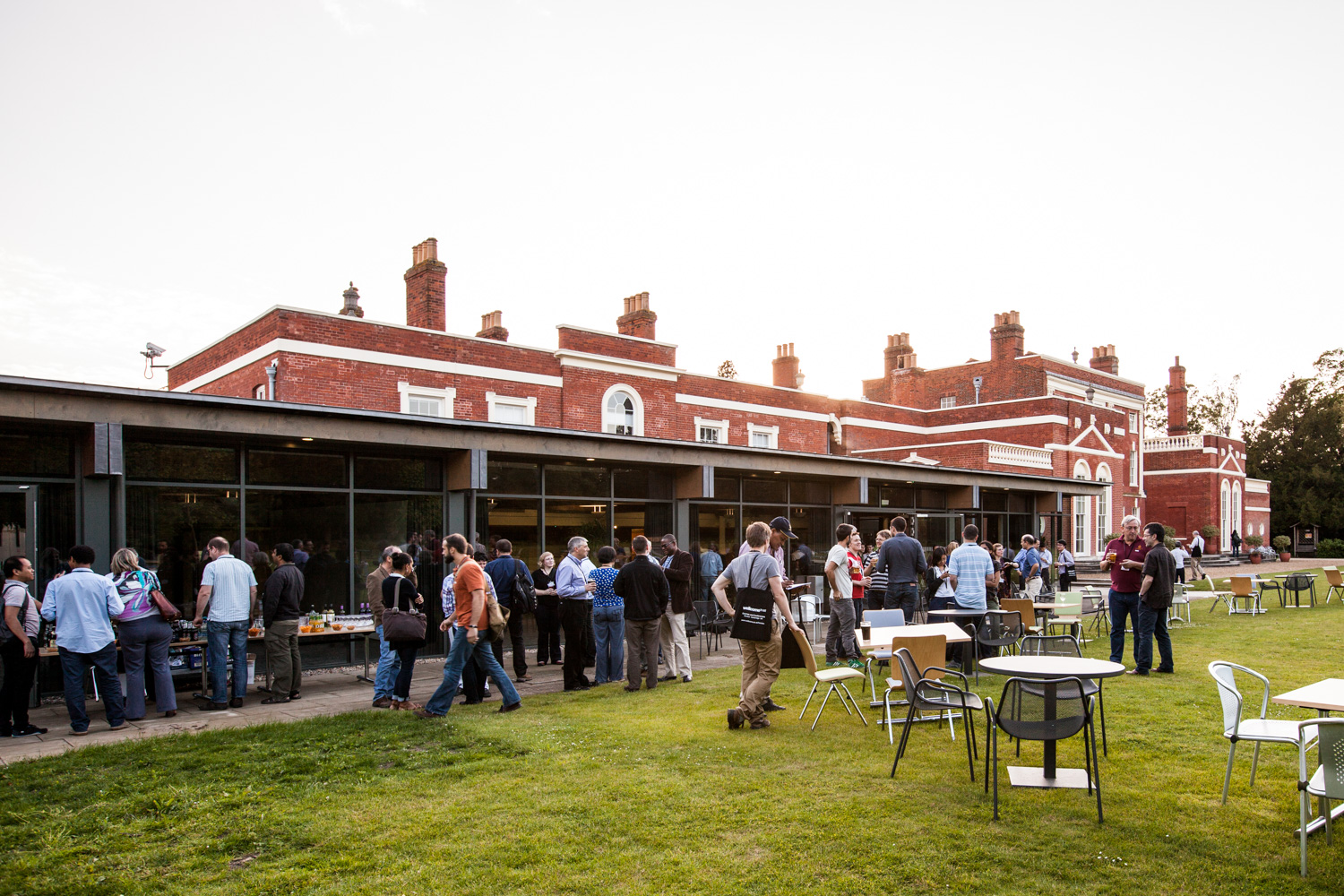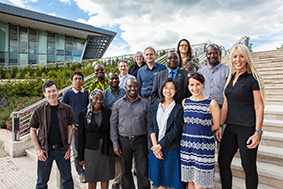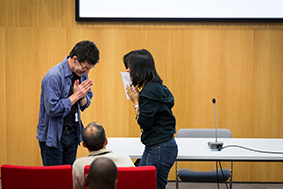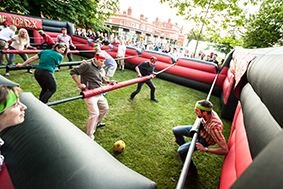
The seventh Genomic Epidemiology of Malaria conference, more affectionately known as GEM, was hosted by the Wellcome Trust Scientific Conferences Programme on the Genome Campus in Hinxton, from 8-11 June. This annual gathering provides a common forum for malaria scientists and clinicians working at the interface of genome science and technology, epidemiology, and statistical and population genetics.
This year’s GEM brought together over 150 participants from 28 countries to discuss the genomic epidemiology of all three malaria genomes—host, mosquito and parasite—highlighting practical relevance to global health, including antimalarial drug resistance, insecticide resistance, and mechanisms of protective immunity.
See the GEM programme for a complete list of speakers.
GEM 2014 Travel Awardees
 The scientific presentations included a special session that gave the GEM 2014 Travel Awardees—12 early career scientists from 11 malaria endemic countries—the opportunity to introduce themselves and present their research. This year’s awardees were supported by the Burroughs Wellcome Fund, the Wellcome Trust Scientific Conferences Programme, the MRC Centre for Genomics and Global Health and MalariaGEN.
The scientific presentations included a special session that gave the GEM 2014 Travel Awardees—12 early career scientists from 11 malaria endemic countries—the opportunity to introduce themselves and present their research. This year’s awardees were supported by the Burroughs Wellcome Fund, the Wellcome Trust Scientific Conferences Programme, the MRC Centre for Genomics and Global Health and MalariaGEN.
Congratulations again to all GEM 2014 Travel Awardees, who were selected by the organising committee based on their application and letters of support: Peter Olupot-Olupot (Busitema University Faculty of Health Sciences, Uganda); Simone Da Silva Santos (Oswaldo Cruz Institute, Brazil); Awa Bineta Deme (Hospital Aristide le Dantec, Senegal); Mahamadou Diakite (University of Bamako, Mali); Luc Djogbenou (Institut Régional de Santé Publique / Université d’Abomey–Calavi, Benin); Maria de Fatima Ferreira de Cruz (Fundação Oswaldo Cruz, Brazil); Alphaxard Manjurano (NIMR, Tanzania); Jonathan Mwangi (Mount Kenya University, Kenya); Supatchara Nakeesathit (Mahidol-Oxford Tropical Medicine Research Unit, Thailand); Akindeh Nji (University of Yaounde, Cameroon); Deodatus Maliti (University of Glasgow, UK); Hidayat Trimarsanto (Eijkman Institute for Molecular Biology, Indonesia).
Poster awards
 In addition to the talks, there were two posters sessions. All participants were invited to nominate posters for a range of prizes. Congratulations to all the GEM Poster Award winners and honourable mentions in the following categories:
In addition to the talks, there were two posters sessions. All participants were invited to nominate posters for a range of prizes. Congratulations to all the GEM Poster Award winners and honourable mentions in the following categories:
‘Most challenging’
Winner: Supatchara Nakeesathit (Mahidol-Oxford Tropical Medicine Research Unit, Thailand) et al. for their poster ‘Isolation and characterization of the merozoite surface protein family from P. malariae.’
Honourable mentions: Lucas Amenga-Etego (Navrongo Health Research Centre, Ghana) et al. for their poster ‘Reappraisal of antimalarial drug selection in Kassena-Nankana Districts of northern Ghana.’ Kayla Barnes (Liverpool School of Tropical Medicine, UK) et al. for their poster ‘Investigating mechanisms of pyrethroid resistance in field populations of Anopheles funestus in Southern Africa.’
‘Best new insight’
Winner: Samuel Assefa (London School of Hygiene and Tropical Medicine, UK) et al. for their poster ‘Detecting selected mutants during in vitro adaptation of Plasmodium falciparum clinical isolates from The Gambia.’
Honourable mentions: Mihir Kekre, Daniel Mead (Wellcome Trust Sanger Institute, UK) et al. for their poster ‘Developments in field applications for sequencing from small blood samples.’ Chris Newbold (Wellcome Trust Sanger Institute and University of Oxford, UK) et al. for their poster ‘An update on the analysis of the global var gene repertoire.’
‘Coolest project’
Winner: Awa Deme (Hopital Aristide Le Dantec, Senegal) et al. for their poster ‘Contribution of HRP2 polymorphism in Senegalese isolates in RDT detection.’
Honourable mentions: Jonathan Mwangi (Mount Kenya University, Kenya) et al. for their poster ‘Genetic determinants of asexual proliferation rate in Plasmodium falciparum.’ Paul Vauterin (University of Oxford, UK) et al. for their poster ‘Panoptes: a web platform for collaborative exploration and visual analytics of genomics data.’
‘Most GEM’
Winner: Lucas Amenga-Etego (Navrongo Health Research Centre, Ghana) et al. for their poster ‘Reappraisal of antimalarial drug selection in Kassena-Nankana Districts of northern Ghana.’
Hounourable mentions: Seth Redmond (Institut Pasteur, France) et al. for their poster ‘GWAS via loss of heterozygosity in Pool-Seq identifies Toll receptors related to Plasmodium falciparum susceptibility in Anopheles gambiae.’ Alex Perkins (University of California – Davis, USA) et al. for their poster ‘Statistical inference of Plasmodium falciparum transmission networks based jointly on epidemiological and genetic data.’
Social events
 In addition to great science, GEM is known as a great chance for networking and fun with colleagues from around the world. Social highlights included Science Speed Dating and, in a nod to the impending World Cup, the GEM 2014 World Cup. This human inflatable table-top football event saw scientists divided into teams representing the three malaria genomes and the computer geeks amongst them, facing-off for malaria football supremacy. The tournament was hotly contested and a laugh for players and fans alike. Congratulations to the computer geeks who won the coveted cup.
In addition to great science, GEM is known as a great chance for networking and fun with colleagues from around the world. Social highlights included Science Speed Dating and, in a nod to the impending World Cup, the GEM 2014 World Cup. This human inflatable table-top football event saw scientists divided into teams representing the three malaria genomes and the computer geeks amongst them, facing-off for malaria football supremacy. The tournament was hotly contested and a laugh for players and fans alike. Congratulations to the computer geeks who won the coveted cup.
Acknowledgements
Credit for the excellent programme belongs with the Scientific Organising Committee: Alfred Amambua-Ngwa, Arjen Dondorp, Dominic Kwiatkowski, Bronwyn MacInnis, Chris Spencer, Ken Vernick and Dyann Wirth. Many thanks to the Wellcome Trust Scientific Conferences and Events teams and to the MalariaGEN Resource Centre for all their hard work behind the scenes. And most of all, thank you to all the participants who came and shared their work and ideas, making for a lively three days of talks, posters, discussions, and fun! We hope to see you again soon.

